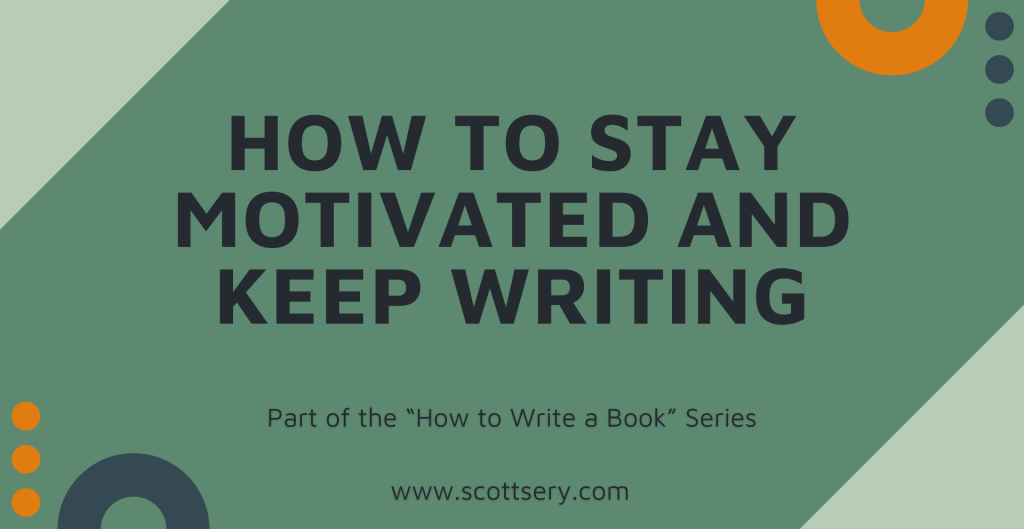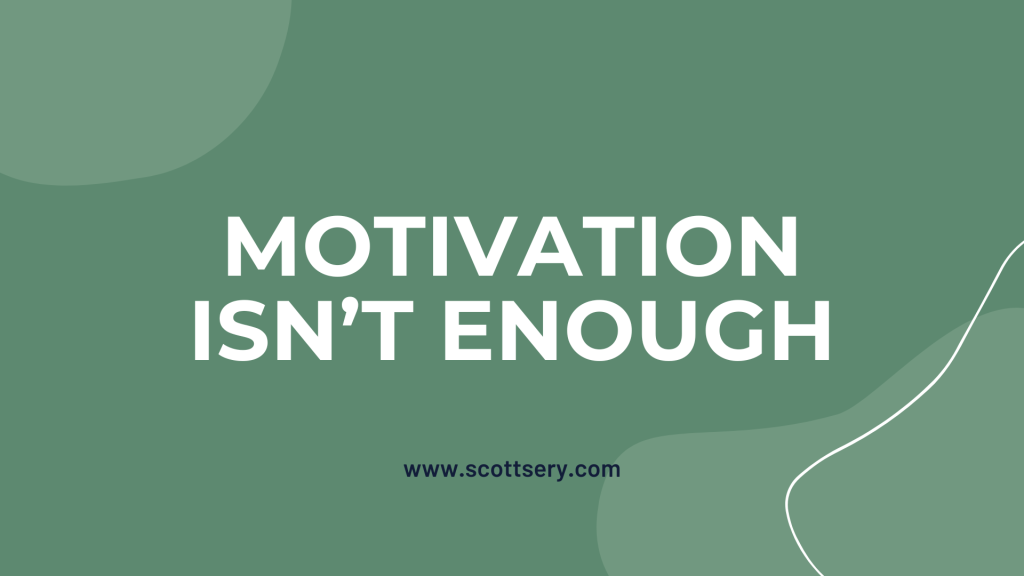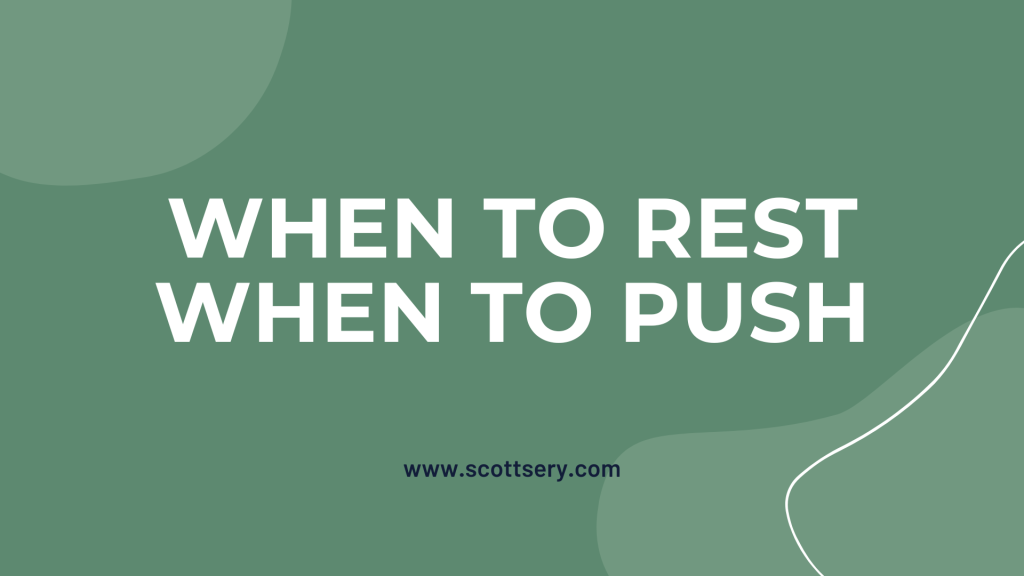
This is a part of the How to Write a Book series, check out the rest of the parts when you’re done here.
Writing Strategies to Stay Motivated
The hardest part of writing a book isn’t starting. It’s finishing.
There’s a statistic that I quote quite a bit, and to be fair I don’t really have a great source for it. It comes from a New York Times article, but even that article doesn’t cite an official study. It says that 80% of people want to write a book, but only 3% of them actually do (and I heard one more that something like less than 1% publish their book).
And that makes me wonder: why?
I’ve boiled it down to two archetypes of writers that fall into the 77% of people who want to, but don’t.
There’s the Idea Person. This individual has a ton of great ideas, a bunch of knowledge packed into that noggin, and really cool life experiences that can help a lot of people. But they aren’t sure how to change those ideas into action. They don’t know how to start writing that book, can’t organize their thoughts, and even if they did they’d be one of those that wrote the book, but never published it.
Then there’s the Halfway-There Writer. They’re eager to get started, and they jump right into writing. The words flow fairly effortlessly, and they get a good way into the book. Then, they stall out. They just never finish the book for some reason.
And what it all boils down to is momentum. The Idea Person can’t get that momentum started, the Halfway-There can’t keep it going. And that is why I’m here to help with some ideas, inspiration, and strategies to keep that momentum from petering out.

Motivation Alone isn’t Enough
Anything you do will have a honeymoon experience. You know what that is, right? When you’re first married, and you jet off on your honeymoon, the relationship is great. It’s most likely new, the little things that your partner does that irritate you aren’t big deals yet, and all is good. It happens with a new job, it happens with a new hobby, it happens with everything.
Soon, that enthusiasm and newness fades.
Over time, your enthusiasm to write this book will go from, “Yippee, let’s get it done!” to, “Ugh, I have to pound out another chapter.” Even those that are professional writers, those that sit down every day all day and type words onto the computer, will eventually find that this is kind of boring.
And that’s why we rely on systems, and not moods. We don’t write only when we’re feeling really good about writing, we write because we’ve trained our bodies and minds to recognize situations that tell us to write, and to get it done.
Consider the professional athlete. These top-tier performers don’t just hit the gym when they feel like it. They don’t run drills when the mood strikes them. They schedule their time at the gym, they schedule their time on the field or course, and they schedule time to learn and develop their abilities.
If you want to actually get that book done, you can’t just rely on the vague notion of writing when you get around to it, because, I’ve tried that. And I have a book that I started almost 10 years ago and I haven’t even looked at it because it’s not a huge priority, I lost my momentum, and more importantly, I simply didn’t schedule it.
How do you create that habit? First, you figure out when during the day do you feel the most creative – now you have something to build on. But remember, inspiration starts books; discipline finishes them.

Building Writing Habits that Stick
You’ve heard the saying, “It takes 90 days to build a habit.” Or is it, “It takes 77 days to build a habit.”? Or, I’ve heard, “It takes 5 weeks to build a habit.” The truth is, there really isn’t a set amount of time that’s going to actually build that habit. Maybe you want to get in the habit of making $1 million per day, and you find out that you can do that through a series of actions that takes just 10 minutes every morning. That habit would be built in a day, right?
The truth is, that habits are built because of the reward you get from them. A buttload of money is an easy and tangible reward; writing habits aren’t quite the same. The reward has to be a little bit of a dopamine dump for doing what you want to do, even if it’s undesirable. And the trick is to set up your day so that your mind stacks habits that already exist.
For example, if you pour your coffee, then sit down for 30 minutes to write, your brain starts associating pouring the coffee with writing. When you accomplish this, thrust your fist into the air and give a hoorah! A silly little action that gives you a micro-dose of dopamine and starts the process of stacking those habits (I highly recommend the book Tiny Habits by BJ Fogg).
Eventually your brain goes into automatic modes; just like the mother turkey protecting her babies when she hears them cry out, “Cheep, cheep!”
And now you’re like, “That’s great Scott, but I don’t drink coffee!” And then I give you one of those looks with my eyes half closed and my mouth flat. Because we both know that you’re being ridiculous and making up the dumbest excuses to justify your inaction.
So, here’s some tips on how you can create that habit and finally get that book written.
- Write at the same time each day.
- Write in the same place each day.
- Set the same lighting in your writing place.
- Have the same beverage when writing.
- Listen to the same song before you get started writing.
- Start small and reward yourself.
If you wanted to get in the habit of working out each day, would you go to a different gym, workout for varying lengths of times, listen to random songs, and try to start with a 4 hour workout every day? Of course not, that’s preposterous (I love using that word). Instead, you might start small by just doing 10 pushups each morning, in your living room, before your coffee, while listening to Eye of the Tiger.
Use that same idea with writing. Tweak and adjust as necessary.
What’s your writing trigger? A word, a beverage, a song, or a time. Find one and lean into it.

Creating Your Environment that Promotes Writing
Now that you’re an expert on habit building, it’s time to figure out where to write. Keep in mind that you should be constantly analyzing this. If it’s not working, change it up. Sometimes your habits can inadvertently make you not want to write, and if that’s the case, you may need to completely start fresh.
To help, make your writing environment motivational. The physical space where you sit down to write should make you really want to write. Sometimes my home office gets cluttered. I have too many papers on the desk, too many unpaid bills looking at me, and too much dust gathering on things I haven’t put away yet because for some reason I can’t be bothered to spend the 3 minutes to put it away. When I notice this, my productivity suffers, and I have to clean things up before I can focus on my work.
I don’t care who you are, a cluttered workspace is an inefficient workspace. If you find yourself as a cluttered person, develop the habit to de-clutter before (and after) you sit down to write your book.
Create a distraction free zone. If you only have an hour a day to write your book, you need to maximize your productivity. Turn the phone off, lock the door, disconnect the internet, and focus. But what happens when you can’t? Change it up. A number of years ago, when I was first starting out, I would do power hours. I’d grab my laptop, head to a coffee shop, and dive in for one hour. No answering the phone, no opening a browser (expect for research purposes), and no breaks for an entire hour. I’d often get more done in that power hour than a whole day of putzing around my office.
Indulge all the senses. Your environment doesn’t just have to be pleasing to the eye, but pleasing to the scent and sounds. Find a candle that you love, and when you start writing, light that sucker up. Now whenever you smell a French Vanilla candle, you’ll want to write your book. This happened to me one fall on accident. I made a bunch of salsa from garden tomatoes, and then in the evening before bed I would watch an episode of Stargate. Now, several years later, if I eat salsa late at night, I think about watching Stargate.
Figure out a few good triggers to put in your environment that will make you think about writing.

Breaking Through that Mid-Book Slump
There’s a part of every book that’s the Messy Middle. In the end, it’s a polished piece of prose that complements the rest of the book. But when you’re writing it might be tedious, cumbersome, or confusing. It’s at this point that the honeymoon phase has ended, and you’re just very much not excited to keep going.
Here’s the thing: this happens to everyone. Every single writer in the history of writing things ever gets to a point in the book where it’s not exciting anymore and it feels like a chore. It’s here that you really have to push yourself and trick your own brain into writing effectively and efficiently.
A few ways that I do this so I’m not left staring at a huge document and wondering why I even bother.
Micro-goals – Set yourself goals that you must accomplish before you go do something else. Your big goal is to finish the book, but that’s a long ways off. Instead, focus on finishing the page, the chapter, or the idea. Once you get into the zone you can really keep moving forward, but those changes cause you to stop. Finish that micro-goal and then cheer for yourself because you’re a badass.
Reward Yourself – Remember when you were a kid and you brought home your report card? For every “A” on it, did your parents give you a reward? Just like denying yourself pleasure for NOT hitting goals, giving yourself pleasure for hitting your goals works well too (not pleasure like that you pervert). Finish that chapter? Have a scoop of ice cream. Finish half the book? Treat yourself to pizza. Complete the book? Buy that new car! Okay, that’s a bit much, maybe.
Keep Track – One of the hard parts of writing in the modern era is that aside from the little page and word count at the bottom of your screen, it doesn’t look like much is changing. So, create a visual tracker. Put up a new sticky note on the wall for each page or chapter. Get some graph paper and fill in a box for each page. This visual reminder can say, “You’ve come a long way, you’ve got this, you can do it!”
Skip Ahead – Sometimes you get stuck in the middle and even with progress trackers, rewards, micro-goals, and more you just keep getting more and more disheartened. You’re telling this story to inspire and encourage people, not bore them to death! So, skip to the end and write the ending. You’ll get to see the outcome, now you’re reinvigorated to get back in there and keep going.
Slumps happen, how do you get through them in other areas of your life?

Writing Strategies to Keep You Moving Forward
We’ve got habits in place, we know how to bust those slumps, but there’s still this overall daunting idea that it’s going to take a long time to finish this thing. What you need to do is make consistent progress. Here are some of the strategies I’ve employed.
- Use mini-deadlines. In my contract for ghostwriting a book, I put a timeline in there. I note that the manuscript will be done in 12 – 18 months. Ideally it will get done a whole lot sooner, but in the world of ghostwriting, you can often run into obstacles when the client doesn’t respond to you for months on end. A deadline that’s 12 months away isn’t that motivating and you’ll struggle to make progress at times. Instead, set deadlines to get the material written. Your deadline to finish that chapter is Thursday by 9pm. Tell yourself this over and over, and make sure that your brain knows this absolutely must get done by then.
- Use word count goals. My goal when writing a book is often 40,000 to 50,000 words. That’s a lot of words and is so far out there it’s hard to really focus in on it. You can write for several hours, get 4,000 words done, and you don’t feel like you’ve really made progress. Instead, make it something achievable. You want to write 500 words each day, hit that mark and anything else is gravy. Quick math here, 500 words a day means you’ll have a 50,000 word book done in 100 days – just over 3 months.
- Find accountability. There’s some solid psychology out there that says we’re more likely to do something if other people know we are doing the thing. We can actually go even deeper. Find an accountability partner, write down your goals, and tell that partner that you will do this. So, if your goal is to write 500 words per day, write that goal down and make it public.
- Use the Pomodoro technique. That power hour I talked about? That’s an example of the Pomodoro technique. Normally you’ll want to keep it shorter, 25 minutes is the go-to for many people. But work really hard without distractions for a short period, then take a little break. A lot of high-achievers use this all day every day.
When you set these goals, and instill deadlines (even the arbitrary ones) you set the tone in your mind that this is urgent. Parkinson’s Law says that a task will expand to fill the time given for it. What that means is that if you give yourself a month to get it done, it will take a month to get it done. But if you give yourself just a week, it will get done in that one week.
Even if you haven’t started writing your book, start considering your goals and targets. Write them down, so when you begin, you know exactly what needs to be accomplished.

What to do When Motivation Wanes
Motivation will wane. Life will get in the way. Interruptions are inevitable.
What’s important is that you regain that inspiration, and if you get de-railed, get yourself re-railed. And remember, this happens to everyone – remember, I’ve been “working” on a book for years. If you’ve lost those writing habits, ease back into them. If you’ve skipped the gym for a year, you can’t jump back in and expect to be at your previous level.
Rekindle that initial motivation. Remember why you started writing this book in the first place. You have a story that people need to hear. Lean into that.
Go back and re-read the parts you’ve written that are just amazing. Draw inspiration from your own words and then say, “Heck yeah, let’s write more amazing things!”
It’s all about progress, not perfection. When you’ve fallen off the wagon, just get back on and get a little bit done today.

How to Reignite Your Inspiration
And you’re thinking, “Scott, it’s not that easy! A lot has changed!” I get it, every time I think of that book I started and never finished, I get overwhelmed and it’s a bit too daunting to even try to get back on the wagon. But what I have done (with other projects) is jumpstart that inspiration with a couple different techniques.
Change it up. New scenery, new coffee shop, new playlist. Sometimes our brains associate our previous methods with not writing. It’s time to create new triggers.
Read something. You probably have favorite authors. Read something they wrote, note their word choices, and pay attention to why you think it’s great.
Write something else. Write a blog, a short story, or a letter. Take your mind away from the book, and put it on something else. Your brain will get those creative juices moving again, and you’ll be able to get back in the flow.
Re-write your why. Why did you start this book? Maybe your motives have changed. Figure out how, and write them down.
There are tons of ways you can shake things up, and perhaps you need to try writing something completely different. Write poetry for a bit. Write fantasy instead. Shoot, write yourself an erotic short story and then delete it before anyone else can read it, you naughty writer.

When to Rest and When to Push
When you publicly announce that you’re committed to the book, you’re more likely to follow through on it (read Robert Cialdini’s book to get the full details on this).
When you give yourself little dopamine rewards, you’re more likely to keep moving (read BJ Fogg’s book to get the full details on this.)
And then know that burnout will kill your creativity. Know the signs, recognize what’s going on, and know that it’s okay to take a little break for a while. But then, pay close attention to your true motives. You can easily tell yourself that you’re just taking a little rest, but you’re really just procrastinating.
When you feel like you’re burning out, schedule your breaks. Don’t just fall into them. Don’t just put down the pen and paper and stop writing saying, “I’ll pick it up again soon.” Because you’ll be like me and you’ll never pick it up again. Instead, say, “I’ll finish this chapter, then I’m taking a four day break. On the fifth day, I’ll get back into this!”
Have you burned out before? What happens in your mind and body, and how did you recover?
What Should I do Now?
There’s a lot to unpack here! From motivation, to environment, to habits, to slump-busting, to taking a little break. So, how do you get moving on this?
Start with each section you just read. Go through them and write down how they apply to you. Make a plan, create a timeline, and get your schedule in order. Writing this book isn’t a sprint, it’s a marathon. You’re not going to run up that mountain, you’re going to do a steady climb that will result with you at the peak.
Remember to keep writing, even when it’s hard. Especially when it’s hard.
Perhaps this is all too ethereal for you. Too vague. Too much of you should kindasorta do this thing, but it’s not entirely applicable to you. If that’s where you’re stuck, it’s time to sign up for the Author’s Mastery Academy. I’ll guide you through this entire book writing process, step-by-step, so you can organize, plan, structure, write, and publish like a pro. Get started by clicking the big button below.
There is another option. If you don’t have the time, the desire, or even the skills to do this on your own, I’ll handle it for you. As a ghostwriter, I can learn your voice and tone, and I can do all the heavy lifting. You just tell me your story and your expertise, and I help you become a published author. Let’s talk about it. Simply schedule some time on my calendar.
